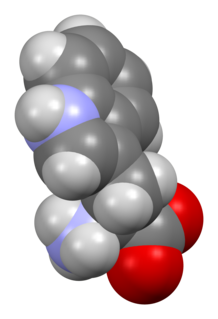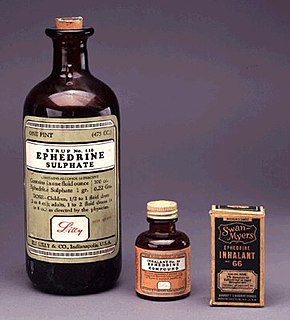Related Research Articles

A vitamin is an organic molecule (or a set of molecules closely related chemically, i.e. vitamers) that is an essential micronutrient that an organism needs in small quantities for the proper functioning of its metabolism. Essential nutrients cannot be synthesized in the organism, either at all or not in sufficient quantities, and therefore must be obtained through the diet. Vitamin C can be synthesized by some species but not by others; it is not a vitamin in the first instance but is in the second. The term vitamin does not include the three other groups of essential nutrients: minerals, essential fatty acids, and essential amino acids. Most vitamins are not single molecules, but groups of related molecules called vitamers. For example, there are eight vitamers of vitamin E: four tocopherols and four tocotrienols. Some sources list fourteen vitamins, by including choline, but major health organizations list thirteen: vitamin A (as all-trans-retinol, all-trans-retinyl-esters, as well as all-trans-beta-carotene and other provitamin A carotenoids), vitamin B1 (thiamine), vitamin B2 (riboflavin), vitamin B3 (niacin), vitamin B5 (pantothenic acid), vitamin B6 (pyridoxine), vitamin B7 (biotin), vitamin B9 (folic acid or folate), vitamin B12 (cobalamins), vitamin C (ascorbic acid), vitamin D (calciferols), vitamin E (tocopherols and tocotrienols), and vitamin K (phylloquinone and menaquinones).

Tryptophan is an α-amino acid that is used in the biosynthesis of proteins. Tryptophan contains an α-amino group, an α-carboxylic acid group, and a side chain indole, making it a polar molecule with a non-polar aromatic beta carbon substituent. It is essential in humans, meaning that the body cannot synthesize it and it must be obtained from the diet. Tryptophan is also a precursor to the neurotransmitter serotonin, the hormone melatonin, and vitamin B3. It is encoded by the codon UGG.
Eosinophilia–myalgia syndrome is a rare, sometimes fatal neurological condition linked to the ingestion of the dietary supplement L-tryptophan. The risk of developing EMS increases with larger doses of tryptophan and increasing age. Some research suggests that certain genetic polymorphisms may be related to the development of EMS. The presence of eosinophilia is a core feature of EMS, along with unusually severe myalgia.

A dietary supplement is a manufactured product intended to supplement one's diet by taking a pill, capsule, tablet, powder, or liquid. A supplement can provide nutrients either extracted from food sources or that are synthetic in order to increase the quantity of their consumption. The class of nutrient compounds includes vitamins, minerals, fiber, fatty acids, and amino acids. Dietary supplements can also contain substances that have not been confirmed as being essential to life, but are marketed as having a beneficial biological effect, such as plant pigments or polyphenols. Animals can also be a source of supplement ingredients, such as collagen from chickens or fish for example. These are also sold individually and in combination, and may be combined with nutrient ingredients. The European Commission has also established harmonized rules to help insure that food supplements are safe and appropriately labeled.

Ephedra is a medicinal preparation from the plant Ephedra sinica. Several additional species belonging to the genus Ephedra have traditionally been used for a variety of medicinal purposes, and are a possible candidate for the soma plant of Indo-Iranian religion. It has been used in traditional Chinese medicine, in which it is referred to as Ma Huang, for more than 2,000 years. Native Americans and Mormon pioneers drank a tea brewed from other Ephedra species, called "Mormon tea" and "Indian tea".

Acetylcysteine, also known as N-acetylcysteine (NAC), is a medication that is used to treat acetaminophen overdose and to loosen thick mucus in individuals with chronic bronchopulmonary disorders like pneumonia and bronchitis. It has been used to treat lactobezoar in infants. It can be taken intravenously, by mouth, or inhaled as a mist. Some people use it as a dietary supplement.

The Pulitzer Prize for Investigative Reporting has been awarded since 1953, under one name or another, for a distinguished example of investigative reporting by an individual or team, presented as a single article or series in a U.S. news publication. It is administered by the Columbia University Graduate School of Journalism in New York City.

The Pulitzer Prize for Beat Reporting was presented from 1991 to 2006 for a distinguished example of beat reporting characterized by sustained and knowledgeable coverage of a particular subject or activity.

Nootropics are a wide range of natural or synthetic supplements or drugs, and other substances that are claimed to improve cognitive function or to promote relaxation, particularly boosting mood, executive functions, attention, memory, creativity, or motivation, in healthy individuals. The most commonly used nootropic in the world is caffeine.

Sibutramine, formerly sold under the brand name Meridia among others, is an appetite suppressant which has been discontinued in many countries. Until 2010, it was widely marketed and prescribed as an adjunct in the treatment of obesity along with diet and exercise. It has been associated with increased cardiovascular events and strokes and has been withdrawn from the market in several countries and regions including Australia, Canada, China, the European Union, Hong Kong, India, Mexico, New Zealand, the Philippines, Thailand, the United Kingdom, and the United States. However, the drug remains available in some countries.
The ECA stack is a drug combination used in weight loss and as a stimulant. ECA is an initialism for ephedrine, caffeine, and aspirin, with variants of it including the EC stack, which removes the aspirin for those who can not tolerate it. Dietary supplements based on or including elements of ECA were popular through the 1990s and early 2000s, but the marketing of ephedra- or ephedrine-containing stimulant combinations for weight loss and bodybuilding is now restricted or illegal in the United States, Canada and Netherlands due to reports of heart attack, stroke, and death associated with these supplements.
Glutaric acidemia type 1 (GA1) is an inherited disorder in which the body is unable to completely break down the amino acids lysine, hydroxylysine and tryptophan. Excessive levels of their intermediate breakdown products can accumulate and cause damage to the brain, but particularly the basal ganglia, which are regions that help regulate movement. GA1 causes secondary carnitine deficiency, as glutaric acid, like other organic acids, is detoxified by carnitine. Mental retardation may occur.
Bill Dedman is a Pulitzer Prize-winning American journalist, an investigative reporter for Newsday, and co-author of the biography of reclusive heiress Huguette Clark, Empty Mansions: The Mysterious Life of Huguette Clark and the Spending of a Great American Fortune.
Hydroxycut is a brand of dietary supplements that is marketed as a weight loss aid. Hydroxycut was originally developed and manufactured by MuscleTech Research and Development; MuscleTech was sold to Iovate Health Sciences in 2003–2004 and declared bankruptcy in 2005; Iovate continues to use MuscleTech as a brand to market Hydroxycut.

The Pulitzer Prize for Local Reporting is awarded to an example of "local reporting that illuminates significant issues or concerns." This Pulitzer Prize was first awarded in 1948. Like most Pulitzers the winner receives a $15,000 award.

MonaVie is a defunct, American multi-level marketing company that manufactured and distributed products made from blended fruit juice concentrates, powders, and purées. The company was the subject of several controversies. Health claims for its products had not been scientifically confirmed or approved by regulatory authorities, and its chairman had been previously involved in false health claims concerning another beverage company. According to Forbes, MonaVie's business plan resembled a pyramid scheme. In 2015, the company defaulted on a US$182 million loan and went into foreclosure. Florida-based Jeunesse Global took over MonaVie’s assets when it purchased the note for $15 million.

The regulation of food and dietary supplements by the U.S. Food and Drug Administration is a process governed by various statutes enacted by the United States Congress and interpreted by the U.S. Food and Drug Administration ("FDA"). Pursuant to the Federal Food, Drug, and Cosmetic Act and accompanying legislation, the FDA has authority to oversee the quality of substances sold as food in the United States, and to monitor claims made in the labeling about both the composition and the health benefits of foods.
Alix Marian Freedman is an American journalist, and ethics editor at Thomson Reuters.
The PubMed Dietary Supplement Subset (PMDSS) is a joint project between the National Institutes of Health (NIH) National Library of Medicine (NLM) and the NIH Office of Dietary Supplements (ODS). PMDSS is designed to help people search for academic journal articles related to dietary supplement literature. The subset was created using a search strategy that includes terms provided by the Office of Dietary Supplements, and selected journals indexed for PubMed that include significant dietary supplement related content. It succeeds the International Bibliographic Information on Dietary Supplements (IBIDS) database, 1999–2010, which was a collaboration between the Office of Dietary Supplements and the U.S. Department of Agriculture's National Agricultural Library.

BuzzFeed News is an American news website published by BuzzFeed. It has published a number of high-profile scoops, including the Steele dossier, for which it was heavily criticized, and the FinCEN Files. Since its establishment in 2011, it has won the George Polk Award, The Sidney Award, National Magazine Award, the National Press Foundation award, and the Pulitzer Prize for International Reporting.
References
- ↑ "The Santa Fe Witch Trial".
- 1 2 "Tamar Stieber, Plaintiff-appellant, v. Journal Publishing Company, D/b/a Albuquerque Journal,defendant-appellee, 127 F.3d 1109 (10th Cir. 1997)".
- ↑ "Tamar Stieber of Albuquerque Journal". www.pulitzer.org. Retrieved February 14, 2019.
- 1 2 "Journal Pulitzer Winner: Prize an Unexpected Surprise with PM-Pulitzers, Bjt".
- ↑ "FDA RECALLS DIET SUPPLEMENT L-TRYPTOPHAN". November 21, 1989 – via www.washingtonpost.com.
- ↑ "FDA RECALLS PRODUCTS BASED ON L-TRYPTOPHAN". March 23, 1990 – via www.washingtonpost.com.
- 1 2 3 4 ""Pulitzer Prize Winner Sues Her Employer" by Stein, M. L. - Editor & Publisher, Vol. 127, Issue 2, January 8, 1994".[ dead link ]
- 1 2 3 "Managing Editors".